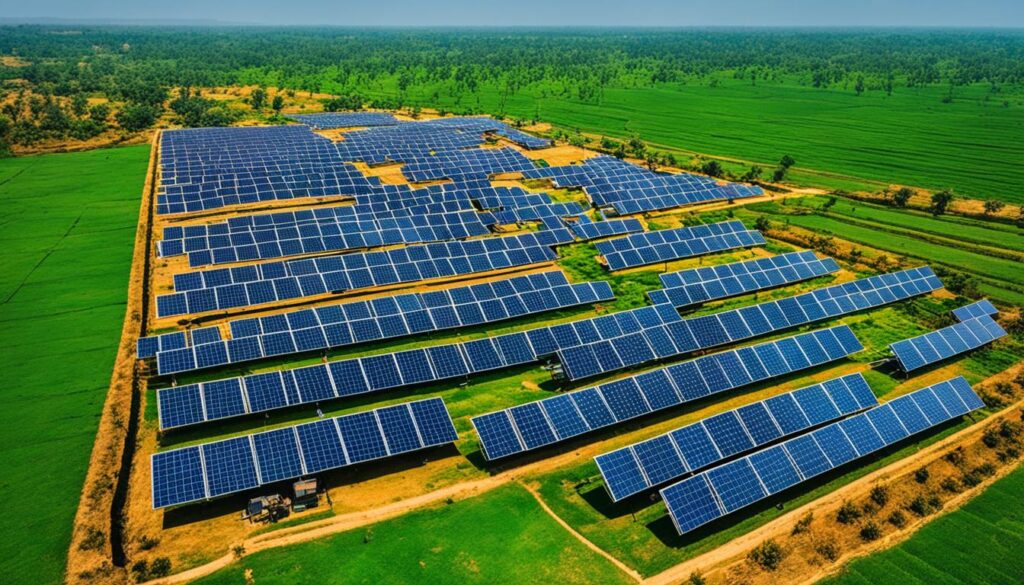India is at the forefront of the global solar energy revolution. With its commitment to achieving 500 GW of renewable energy capacity by 2030, the country is making significant strides towards a sustainable future. Currently ranking 4th globally in solar power capacity, India’s solar installed capacity has increased from 21,651 MW to 70,096 MW in 2023. This growth can be attributed to various initiatives and policies implemented by the government, such as the Production Linked Incentive (PLI) Scheme and the Solar Park Scheme. Solar Energy Information for India’s Future
Solar energy offers numerous benefits, including reducing carbon emissions, mitigating climate change, and promoting green energy resources. The International Solar Alliance (ISA) plays a crucial role in promoting solar energy adoption globally, further establishing India as a key player in the renewable energy sector. As a tropical country, India receives abundant solar radiation throughout the year, making solar power a viable and sustainable option to meet its energy demands.
The future holds great potential for solar advancements in India. From innovative photovoltaic technologies to solar farms on water, the spectrum of innovations in the solar energy sector is diverse. The private sector, along with government support, plays a vital role in driving progress and attracting investments. By creating a conducive environment for growth and encouraging domestic manufacturing, India can become self-reliant in clean energy and achieve its clean energy targets.
Key Takeaways:
- India is a global leader in solar energy, with ambitious targets for renewable energy capacity.
- The government’s initiatives and policies, such as the PLI Scheme, are driving the growth of solar energy in India.
- Solar energy offers numerous benefits, including reducing carbon emissions and mitigating climate change.
- India’s geographical advantage as a tropical country makes solar power a viable option.
- The International Solar Alliance promotes solar energy adoption globally.
The Potential of Solar Advancements in India
Solar energy advancements in India are driving innovation and progress in the industry. From solar panels adorned with nanowires to solar farms on water and solar paint, the spectrum of innovations is diverse. Solar power offers numerous advantages, including mitigating climate change, reducing pollution, and securing the planet’s future. India’s geographical advantage as a tropical country allows it to receive generous amounts of solar radiation throughout the year, making solar energy a viable option. Several states in India, such as Rajasthan and Gujarat, have immense potential for solar energy generation.
The private sector’s role in promoting renewable energy is crucial, and the government’s policies, such as encouraging domestic manufacturing and reducing dependence on imports, support the Aatma Nirbhar mission. To meet the increasing energy demand and fulfill its clean energy targets, India needs to attract foreign direct investment and create a conducive environment for the growth of the solar energy sector.
Solar Energy Information
- Reduces carbon emissions and helps combat climate change
- Provides a sustainable and clean energy resource
- Reduces pollution and improves air quality
- Diversifies the energy mix, reducing dependence on fossil fuels
- Promotes energy independence and security
- Creates jobs and drives economic growth
“Solar power is a game-changer in the quest for sustainable energy solutions. With advancements in photovoltaic technology and a focus on clean energy resources, India has the potential to become a global leader in solar energy.”
India’s commitment to renewable energy and sustainable development is evident through its ambitious goals and policies. By utilizing its abundant solar resources and embracing technological advancements, India can harness the power of solar energy to create a brighter and greener future for its citizens.

| State | Solar Energy Potential (in MW) |
|---|---|
| Rajasthan | 142,940 |
| Gujarat | 56,763 |
| Andhra Pradesh | 46,327 |
| Telangana | 44,453 |
| Madhya Pradesh | 42,482 |
Conclusion
India’s solar energy sector has witnessed extraordinary growth and holds immense potential for the future. With a pipeline of 58 GW utility-scale projects and a growing involvement of the private sector, solar power is emerging as a competitive and sustainable solution to meet India’s soaring energy demands. The country’s geographical advantage, coupled with upcoming solar projects and a focus on self-reliance, has led to the rapid expansion of the solar energy market.
To further propel India towards its clean energy goals, it is crucial to develop a robust local solar manufacturing ecosystem and implement suitable government policies. This will not only create a favorable environment for the growth of the solar power sector but also contribute to job creation and economic prosperity. Additionally, harnessing solar energy offers an array of benefits, including reductions in carbon emissions and the establishment of sustainable energy solutions.
By capitalizing on the power of solar advancements, India can embark on a path towards a brighter and more sustainable future. The solar energy sector’s remarkable progress, driven by India’s commitment to renewable energy, presents a significant opportunity to transform the nation’s energy landscape and leave a positive impact on the environment. With continued investments, innovation, and supportive policies, India can lead the way in deploying solar power as a key driver for sustainable development.
FAQ
What is solar energy?
Solar energy refers to the energy derived from the sun’s radiation. It is converted into usable electricity through solar panels or used directly for heating purposes.
What are the benefits of solar panels?
Solar panels offer several advantages, including reduced electricity bills, decreased reliance on non-renewable energy sources, lower carbon emissions, and the potential to earn money through excess energy production.
What are renewable energy sources?
Renewable energy sources are those that are naturally replenished and do not deplete over time. Examples include solar energy, wind power, hydropower, geothermal energy, and biomass energy.
What are some solar power facts?
Solar power is a clean, renewable resource that does not produce greenhouse gas emissions during operation. It can be used for various applications, from powering homes and businesses to facilitating the charging of electric vehicles.
Where can I find green energy resources?
Green energy resources can be found in various forms, such as solar energy, wind energy, hydroelectric power, geothermal energy, and biomass energy. These sources provide sustainable alternatives to traditional fossil fuels.
What are the advantages of solar energy?
Solar energy offers numerous benefits, including environmental sustainability, reduced carbon footprint, long-term cost savings, energy independence, and job creation in the renewable energy sector.
What are sustainable energy solutions?
Sustainable energy solutions refer to the use of renewable energy sources that have minimal impact on the environment and can meet the world’s energy needs in a sustainable manner.
What is photovoltaic technology?
Photovoltaic technology involves the conversion of sunlight into electricity using solar cells. These cells, present in solar panels, capture photons and generate a direct current (DC) that can be converted into alternating current (AC) for practical usage.
What are clean energy resources?
Clean energy resources, such as solar energy, wind power, and hydropower, are sources of energy that have minimal environmental impact and do not produce harmful emissions or waste.
How does solar energy contribute to a sustainable future?
Solar energy helps reduce greenhouse gas emissions, combat climate change, and promote energy independence. By harnessing the power of the sun, we can move towards a cleaner, more sustainable future.

